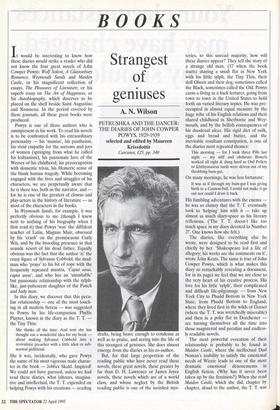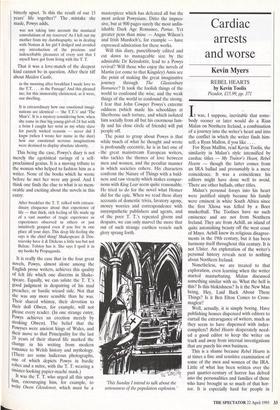BOOKS
Strangest of geniuses
A. N. Wilson
PETRUSHKA AND THE DANCER: THE DIARIES OF JOHN COWPER POWYS, 1929-1939 selected and edited by Maureen Krissdottir Carcanet, £25, pp. 340 It would be interesting to know how these diaries would strike a reader who did not know the four great novels of John Cowper Powys: Wolf Solent, A Glastonbury Romance, Weymouth Sands and Maiden Castle, or his magnificent collection of essays, The Pleasures of Literature; or his superb essay on The Art of Happiness, or his Autobiography, which deserves to be placed on the shelf beside Saint Augustine and Rousseau. In the period covered by these journals, all these great books were produced.
Powys is one of those authors who is omnipresent in his work. To read his novels is to be confronted with his extraordinary personality — his 'manias', his pantheism, his vivid empathy for the sorrows and joys of women (springing from what he called his lesbianism), his passionate love of the Wessex of his childhood, his preoccupation with domestic trivia, his Homeric sense of the blank human tragedy. While becoming engaged with the lives and struggles of his characters, we are perpetually aware that he is there too, both as the narrator, and for he is one of the greatest of clowns and play-actors in the history of literature — as most of the characters in the books.
In Weymouth Sands, for example, it was perfectly obvious to me (though I knew next to nothing of his biography when I first read it) that Powys 'was' the diffident teacher of Latin, Magnus Muir, obsessed by his `crush' on the promiscuous Curly Wix, and by the brooding presence in that seaside resort of his dead father. Equally obvious was the fact that the author 'is' the crazy figure of Sylvanus Cobbold, the mad- man who 'prays' to his bit of rope with the frequently repeated mantra, 'Caput anus, caput anus', and who has an 'unsuitable' but passionate relationship with the sylph- like, just-pubescent daughter of the Punch and Judy man.
In this diary, we discover that this pecu- liar relationship — one of the most touch- ing in all modern fiction — was suggested to Powys by his life-companion Phyllis Playter, known in the diary as the T. T. the Tiny Thin:
She thinks all the time. And now she has thought out a wonderful idea for my book about making Sylvanus Cobbold into a revivalistic preacher with a little idiot or sub- normal girlfriend.
She it was, incidentally, who gave Powys the name of his most vigorous male charac- ter in the book — Jobber Skald. Inspired! We could not have guessed, unless we had read these diaries, what labours, imagina- tive and intellectual, the T. T. expended on helping Powys with his creations — reading drafts, being brave enough to condemn as well as to praise, and seeing into the life of this strangest of geniuses. She does almost emerge from the diaries as his co-author.
But, for that large proportion of the reading public who have never read these novels, these great novels, these greater by far than D. H. Lawrence or James Joyce novels, these novels which are of a world class, and whose neglect by the British reading public is one of the weirdest mys- teries, to this unread majority, how will these diaries appear? They tell the story of a strange old man, (57 when the book starts) sharing a small flat in New York with his little sylph, the Tiny Thin, their doll Olwen and their dog, sometimes called the Black, sometimes called the Old. Powys earns a living as a hack lecturer, going from town to town in the United States to hold forth on varied literary topics. He was pre- occupied in almost equal measure by the huge tribe of his English relations and their shared childhood in Sherborne and Wey- mouth, and by the hellish consequences of his duodenal ulcer. His rigid diet of milk, eggs and bread and butter, and the inevitable resultant constipation, is one of the diaries most repeated themes: This morning — for I took three Pills last night — my stiff and obdurate Bowels worked all right & dung hard as Owl Pellets or Ichthyosaurus turds were driven out of my throbbing bum-gut.
On many mornings, he was less fortunate: It was as if through my bum-gut I was giving birth to a Cannon-ball. I could not make it go out nor could I draw it back.
His fumbling adventures with the enema he was so clumsy that the T. T. eventually took to 'helping' him with it — take up almost as much diary-space as his literary reflexions. (`The T. T. doesn't like too much space in my diary devoted to Number 2!'. One knows how she felt.) The diaries, like everything else he wrote, were designed to be read first and chiefly by her. 'Shakespeare led a life of allegory; his works are the comments on it', wrote John Keats. The same is true of John Cowper Powys, which is what makes this diary so remarkably revealing a document, for in its pages we feel that we are close to the very heart of his creative process. His love for his little 'sylph', their complicated and difficult life-pilgrimage — from New York City to Phudd Bottom in New York State; from Phudd Bottom to England, where they lived first in the wilds of Dorset (where the T. T. was wretchedly miserable) and then in a poky flat in Dorchester are turning themselves all the time into those magisterial and peculiar and endless- ly readable novels.
The most powerful evocation of their relationship is probably to be found in Maiden Castle, where the ineffectual Dud Noman's inability to satisfy the emotional needs of Wizzie leads to one of the most dramatic emotional dénouements in English fiction. (Why has it never been taken up by the feminists?) When she read Maiden Castle, which she did, chapter by chapter, aloud to the author, the T. T. was bitterly upset. 'Is this the result of our 15 years' life together?' The , mistake she made, Powys adds, was not taking into account the maniacal convolutions of my reserves! As I left out my mother from my Autobiography, so in dealing with Noman & his girl I dodged and avoided any introduction of the precious and indescribable pleasures of every sort that I myself have got from living with the T. T.
That it was a love-match of the deepest kind cannot be in question. After their tiff about Maiden Castle,
in the morning after breakfast I made love to the T.T. . . . in the Passage! And this pleased me; for this immorality christened, as it were, our dwelling.
It is extraordinary how our emotional imagi- nations are identical — 'the T.T.'s' and The Man's'. It is a mystery considering how, when she came in that big young-girl-of-24 hat with a brim I caught her wrist as my white slave for purely wicked reasons — never did I know (when I wrote her name in the dust) how our emotional nervous imaginations were destined to display absolute identity.
This being the case, Powys's diary is not merely the egotistical ravings of a self- proclaimed genius. It is a moving tribute to the woman who helped to fashion him as a writer. None of the books which he wrote before he met her were any good. And I think one finds the clue to what is so mem- orable and exciting about the novels in this entry:
After breakfast the T. T. talked with extraor- dinary eloquence about that experience of life — that thick, rich feeling of life made up of a vast number of tragic experience or experiences observed in others or just intuitively grasped even if you live in one place all your days. This deep life-feeling she says is the chief thing! Shakespeare & Dos- toievsky have it & Dickens a little too but not Balzac. Tolstoy has it. She says I spoil it in my books by Propaganda.
It is really the case that in the four great novels, Powys, almost alone among the English prose writers, achieves this quality of felt life which one discerns in Shake- speare. Equally, we can salute the T. T.'s good judgment in despairing of his mad preacher, or bardic wizard side. Not that she was any more sensible than he was. Their shared whimsy, their devotion to their doll Olwen, for example, will not please every reader. (In one strange entry, Powys achieves an erection merely by stroking Olwen). The belief that the Powyses were ancient kings of Wales, and their move to that Principality for the last 28 years of their shared life marked the change in his writing from modern romance to Welsh history and mythology. (There are some ludicrous photographs, one of which depicts Powys in bardic robes and a mitre, with the T. T. wearing a sinister-looking papier-mache mask.) It was the T. T. who urged all this upon him, encouraging him, for example, to write Owen Glendower, which must be a masterpiece which has defeated all but the most ardent Powysians. Ditto the impres- sive, but at 900 pages surely the most unfin- ishable Dark Age Romance, Porius. Yet greater pens than mine — Angus Wilson's and Irish Murdoch's, for example — have expressed admiration for these works.
Will this diary, punctiliously edited and cut down to manageable size by the admirable Dr Krissdottir, lead to a Powys revival? Will those who enjoy the novels of Martin (or come to that Kingsley) Amis see the point of making the great imaginative journey through The Glastonbury Romance? It took the foolish things of the world to confound the wise, and the weak things of the world to confound the strong. I fear that John Cowper Powys's extreme oddness (which made his schooldays at Sherborne such torture, and which isolated him socially from all but his enormous fam- ily and his close circle of friends) will put people off.
The point to grasp about Powys is that while much of what he thought and wrote is profoundly eccentric, he is in fact one of the great mainstream European writers, who tackles the themes of love between men and women, and the peculiar manner in which societies cohere. His characters confront the Nature of Things with a bald- ness and raw vivacity which makes compar- isons with King Lear seem quite reasonable. He tried to do for the novel what Homer did for the epic. When we read these diary accounts of domestic trivia, lavatory agony, money worries and correspondence with unsympathetic publishers and agents, and of the poor T. T.'s repeated gloom and despairs, we can only marvel the more that out of such strange earthen vessels such glory sprang forth.
`This Sunday I intend to talk about the seriousness of the population explosion.'



























































 Previous page
Previous page